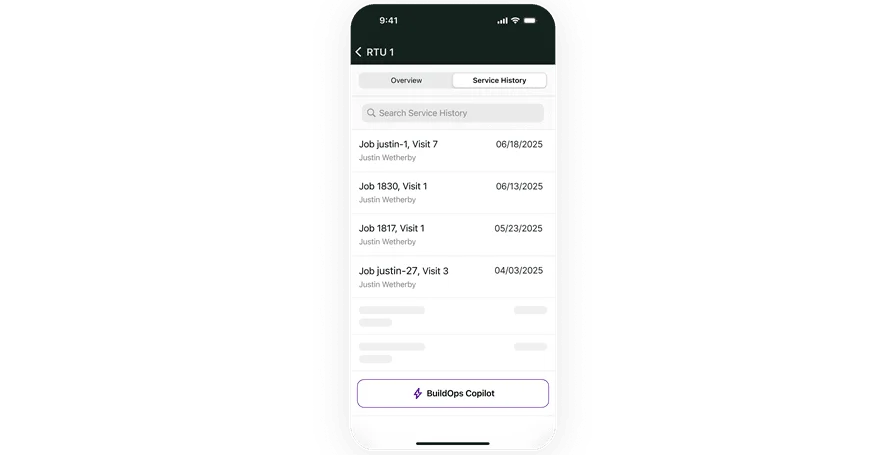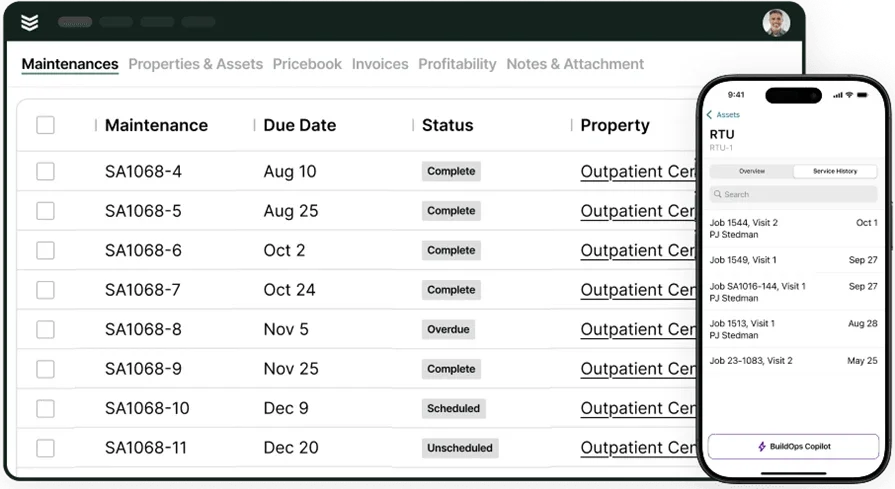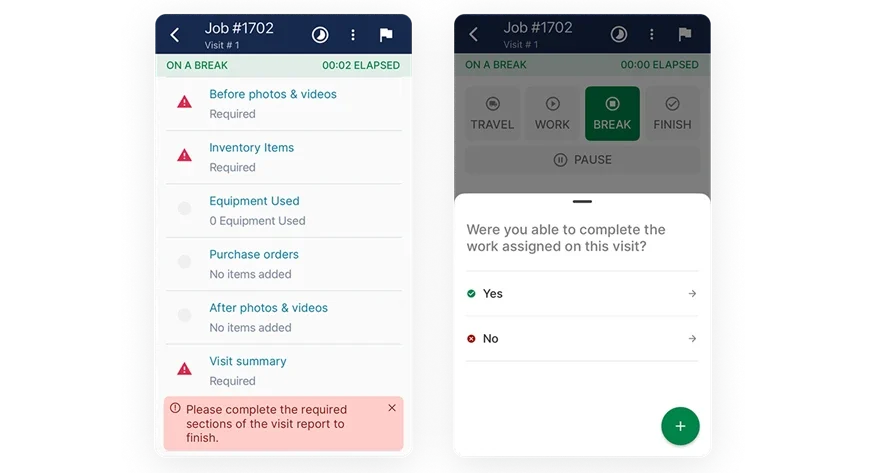Managing field teams across installs, retrofits, and service contracts takes precision. Mechanical contractors aren’t just working with tools—they’re working against time, scope creep, and crews stretched thin across job sites. Whether you’re coordinating chillers in a commercial tower or troubleshooting rooftop units during a service call, the wrong app slows everything down. That’s where choosing the right mechanical contractor app comes into play—one that matches how your team actually works in the field.
In the mechanical industry, where timelines are tight and equipment is complex, having the right digital tools helps crews stay ahead of the work. If you’re weighing your options, this breakdown focuses on the apps for mechanical contractors that actually hold up under pressure—helping your team cut the noise and get the job done.
Here’s what we’ll cover:
- How to choose a mechanical contractor app that fits your workflow
- 6 key features to look for in a mechanical contractor app
- 8 best mechanical contractor apps used in the field today
- 7 benefits of using apps for mechanical contractors
- 3 important FAQs about mechanical contractor apps—answered
Let’s kick things off with what really matters—how to size up whether an app fits the way your crew handles work in the field.
How to choose a mechanical contractor app that fits your workflow
Mechanical contractors don’t have time for software that slows them down. Whether it’s rerouting crews mid-job, generating equipment reports, or logging labor hours from a rooftop unit install, every click counts. A mechanical contractor app has to match how your team actually works in the field—from job to job, crew to crew, boiler room to rooftop.
The best apps are built to handle real-world service conditions of mechanical contractors, not just back-office admin. From service techs to project managers, the right app keeps your crew connected and jobs on track—even when the pressure kicks in. Here are five key areas to dig into before choosing any mechanical contractor app—especially if you want tools that keep up when the job hits the field.
- Workflow fit – Will this app support the way your crew tackles installs and service jobs? Does it handle complex mechanical systems like boilers, chillers, and rooftop units? Can it adapt to both one-off repairs and scheduled contract work?
- Tech usability – Can your crew actually use this on the job without needing a cheat sheet? Does the interface work for field teams in real conditions—while wearing gloves, on small screens, or with low connectivity? Can techs submit updates fast without stopping the work?
- Support and reliability – Will this app stay online when your crew is in a basement mechanical room or remote jobsite? Does it offer strong offline support? How quick is customer support when something needs fixing?
- Device flexibility – Does the app work across iPads, phones, and field laptops? Can your team switch between devices without losing data? Does it support tools like voice input, camera uploads, or offline checklists?
- Features – Does the app handle quoting, dispatch, job tracking, and invoicing all in one system? Can it sync with your customer updates, assets, and service history? Does it reduce miscommunication between techs and office staff?
Next, we’ll get into the six core features mechanical contractors should be watching for—especially the ones that help teams finish work faster and with fewer callbacks.
6 key features to look for in a mechanical contractor app
Between juggling install schedules, routing crews, quoting jobs on the fly, and managing assets across multiple locations, mechanical contractors deal with layers of complexity that office teams rarely see. The best mechanical contractor app clears that noise. It connects the field to the office, pulls key info into one place, and cuts out the time-wasting back-and-forth that slows everything down.
Below are the six core features that actually support how mechanical contractors operate in the field. These aren’t extras—they’re the backbone of apps for mechanical contractors that crews can depend on every day.
1. Smart scheduling and real-time dispatch
Job schedules change by the hour. A solid mechanical contractor app needs both a field service scheduling system and a real-time dispatching tool that sync up seamlessly. Without both, your crew ends up waiting on calls or scrambling at the last minute.
Let’s say a tech finishes a boiler maintenance call ahead of time. Instead of calling the office to ask what’s next, a notification reroutes them to a nearby chiller issue that just came in. That’s one truck handling two jobs before lunch—with no phone tag, no delays, and no gaps in the schedule.
2. Mobile-first usability for field techs
If the software doesn’t work from the field, it doesn’t work—period. A strong technician mobile app lets techs pull up work orders, upload service photos, record notes, and complete checklists without needing to return to the office or wait for someone to email a form.
Take this scenario: A tech is servicing an RTU on a five-story building and needs to log a part replacement. Instead of heading back down to the truck or calling dispatch, they snap a photo, add it to the work order, and check off the safety checklist—right from their phone, while still on the roof.
3. On-site quoting and estimating tools
Mechanical contractors win work when they quote fast. A job quoting tool built into your app means techs can generate and send estimates before leaving the site—whether it’s for a replacement, a change order, or a new system install.
Let’s say your crew is mid-way through a piping retrofit and the building manager asks about upgrading the air handlers. Instead of pushing it to “get back later,” your tech opens the app, pulls in service data, and builds the quote right then—helping you land extra work on the spot.
4. CRM that tracks every customer detail
Service history matters in this line of work. A mechanical contractor CRM system keeps track of everything—asset history, service contracts, previous repairs, and site-specific notes. Your crew shouldn’t show up guessing what’s been done.
For example, your techs roll up to a data center for a quarterly maintenance check. With a few taps, they see notes from the last inspection, including vibration issues flagged on a condenser pump. That heads-up saves time and avoids re-diagnosing a known problem.
5. Invoicing and payment built for the field
Billing doesn’t need to wait until your tech is back at the shop. Invoicing tools and mobile payment options built into the app help techs close out jobs clean—no gaps, no paperwork piles. Say your team wraps up a compressor replacement late Friday afternoon. Instead of pushing billing to Monday, the tech sends the invoice right from the job, and the client pays before they even leave the site. No follow-ups, no admin hold-ups.
6. Real-time reporting for better job oversight
Every finished job tells you something. A strong reporting dashboard gives you daily snapshots of job progress, delays, cost overruns, and labor hours—so you stay in control, even when you’re offsite.
Think of a service manager overseeing multiple crews across a school district. One report shows which teams finished early, which jobs need follow-up, and where labor hours ran high. That’s the kind of info that helps you adjust fast and quote smarter next time.

Explore our service management suite
Equip your contractors with the tools they need to keep mechanical projects moving.
Other notable features for mechanical contractors
While the first six features cover the daily heavy lifting, a strong mechanical contractor app also brings added value through secondary tools. These features don’t always drive the job, but they support your operations behind the scenes—keeping your team informed and organized across the board. If you’re comparing apps for mechanical contractors, these extras can tip the scale when deciding what works best for your field crew and office team alike.
- Contract tracking tools – Managing service agreements across dozens of clients requires clarity. A service agreement tracker lets you monitor active contracts, renewal dates, and recurring visits—so your PMs and coordinators stay on top of deliverables without chasing paperwork.
- Fleet and vehicle oversight – A built-in fleet management system helps you monitor company vehicles, track service logs, and optimize routing. It adds visibility to where your assets are and how they’re being used across jobs.
- Time capture tools – A time tracking system records hours by technician, job, or task. That visibility supports accurate payroll, cleaner invoicing, and tighter labor cost control.
- Lead management and job pipeline – A pipeline tracker keeps your sales and estimating teams aligned with ops. See open bids, job status, and conversion trends in one place—helping you keep new work flowing without overlap or drop-off.
These added features won’t always take center stage, but they round out a mechanical contractor app built for real-world field service work. When the core tools handle the job and the extras support everything around it, you’ve got a system that actually works the way your team does—whether you’re managing installs, service calls, or long-term contracts.
8 best mechanical contractor apps used in the field today
Choosing the best mechanical contractor app isn’t about fancy dashboards or glossy sales decks. It comes down to how well the software fits your crew’s daily work—installing systems, managing field service, tracking assets, and keeping projects on pace. These tools are used by real teams in the field, each serving a different slice of the mechanical industry. Here's how they stack up, what they offer, and where they may fall short for contractors needing tight workflows across field and office.
1. Best for commercial contractors: BuildOps
BuildOps is a full-service platform built for commercial mechanical contractors. It connects field teams with office operations in real time—covering scheduling, job tracking, technician tools, and invoicing all in one place. Its mobile-first platform is designed specifically for mechanical crews handling complex installs and recurring service work. Field teams can access asset histories, complete digital forms, and update job progress straight from the site.
Industry Specialization: Commercial mechanical contracting
How Pricing Works: Custom pricing based on team size and needs
Key Features:
- Mobile technician app
- Asset tracking and service history
- End-to-end job updates and real-time sync
What Sets It Apart: BuildOps brings deep mechanical-specific workflows together—covering everything from dispatch to reporting—in a single system that works well for both high-volume service teams and long-term projects.

Take a closer look at BuildOps
Keep jobs on track—whether you’re managing installs, retrofits, or maintenance calls.
2. Best for residential contractors: Raken
Image Source: Raken
Raken focuses on daily reporting, crew tracking, and time logs—giving residential teams simple tools to document jobsite activity and progress. It's strong for teams looking to centralize documentation and reduce the need for paper timecards or handwritten updates. You also get safety compliance tracking and a clean interface for quick field use. This app may not suit teams that need quoting, service dispatch, or more detailed asset workflows.
Industry Specialization: Residential, light commercial
How Pricing Works: Starts at $20/month per user, varies by package
Key Features:
- Digital time tracking
- Photo documentation and daily reports
- Safety and compliance logs
What Sets It Apart: Ideal for companies that want fast field documentation with solid mobile access and daily logs.
3. Best for general contractors: Procore
Image Source: Procore
Procore is a powerhouse platform used across construction for everything from project management to financials. Mechanical contractors working under general contractors can use it for drawing management, RFIs, submittals, and collaboration with other trades. It supports documentation-heavy projects and helps streamline communication across jobsite stakeholders. Due to its size and learning curve, it may feel too heavy for service-focused teams or companies that aren’t deeply embedded in construction management.
Industry Specialization: General construction, subcontracting
How Pricing Works: Custom quotes based on scale and project needs
Key Features:
- Document and drawing control
- RFIs and submittal workflows
- Jobsite collaboration tools
What Sets It Apart: Strongest when used on larger projects where collaboration and document control are key.
4. Best for small to mid-sized contractors: Jobber
Image Source: Jobber
Jobber offers a simple platform for scheduling, job tracking, and client communication. It’s easy to set up and helps small teams manage work from quote to invoice without needing extra layers of admin. Jobber's interface is clear, and it includes mobile access for field teams who want a clean, task-focused experience. It may lack deeper features like asset tracking, custom forms, or contract management that mid-sized service contractors often need.
Industry Specialization: Small to mid-sized service businesses
How Pricing Works: Starts around $29/month per user
Key Features:
- Scheduling and client reminders
- Mobile app for task updates
- Invoicing and online payments
What Sets It Apart: Helps lean teams manage work and get paid fast, with fewer clicks.
5. Best for independent contractors: Jonas Construction
Image Source: Jonas
Jonas Construction delivers a more traditional field service management solution focused on job costing, billing, and dispatch. It’s geared toward contractors who need deeper financial tracking built into their daily operations. The system provides strong accounting integration and good visibility into labor costs per job. However, its interface feels dated, and setup requires time—so it may not fit teams looking for fast implementation or a mobile-first experience.
Industry Specialization: Mechanical, electrical, plumbing service businesses
How Pricing Works: Custom quotes based on modules and team size
Key Features:
- Job costing and accounting features
- Field dispatch and scheduling
- Equipment and labor tracking
What Sets It Apart: Solid fit for cost-driven teams that want project financials baked into the system from day one.
6. Best for time and expense tracking: DATABASICS
Image Source: SAMPro
DATABASICS (by SAMPro) is built for teams that prioritize detailed time entry and expense tracking across service work and project timelines. It gives mechanical contractors the ability to break down hours by tech, job, or cost code, and includes approval workflows that simplify billing and payroll accuracy. It also supports per diem tracking, mileage logs, and financial compliance features that help keep costs aligned with job scopes. This tool may not be the best fit for teams needing dispatch, quoting, or technician mobile tools.
Industry Specialization: Service-based contractors and project-based work
How Pricing Works: Custom quotes based on organization size and modules
Key Features:
- Time and expense reporting
- Job costing and budget tools
- Approval workflows and audit trails
What Sets It Apart: Focused time and cost control that ties directly into back-office accounting systems.
7. Best for GPS and field visibility: IndusTrack
Image Source: IndusTrack
IndusTrack blends scheduling, GPS tracking, and job management into one system—giving service managers real-time visibility over crews and their movements. Its field app supports status updates, photo capture, and digital forms, while office teams can assign work and monitor vehicle routes throughout the day. The platform includes tools to automate recurring jobs and send customer alerts based on arrival time or job status. While it's strong on location tracking and scheduling, it may lack depth in estimating, CRM, and reporting.
Industry Specialization: Field service contractors and maintenance-focused companies
How Pricing Works: Tiered pricing depending on features and user count
Key Features:
- GPS and route tracking
- Technician job updates
- Digital forms and mobile workflows
What Sets It Apart: Combines scheduling and real-time GPS in a single interface with mobile updates.
8. Best for subcontractor collaboration: Rivet
Image Source: Rivet
Rivet focuses on communication across teams, subs, and GCs. It offers a centralized chat-style platform where mechanical contractors can manage tasks, schedules, RFIs, and updates without needing to bounce between emails and texts. It also supports file sharing and integrates with calendars to keep teams on track. However, it lacks service-side features like dispatch, quoting, or invoicing that field teams often require.
Industry Specialization: Subcontractors and trade contractors
How Pricing Works: Offers a free plan and paid tiers depending on team size
Key Features:
- Project-based messaging
- Calendar and task integration
- File and document sharing
What Sets It Apart: Simplifies cross-team coordination through real-time messaging and task management.

Get the HVAC Growth Report
Find out how leading mechanical contractors expand and grow their business.
7 benefits of using apps for mechanical contractors
For mechanical contractors, every job involves moving parts—literally and logistically. From tracking assets across campuses to managing field teams split between installs and maintenance calls, things can slip fast without the right tools. A mechanical contractor app gives teams the visibility, speed, and coordination needed to keep jobs tight and margins healthy.
These benefits go beyond flashy dashboards—they’re rooted in what actually helps techs and managers stay on the same page and in control.
1. Fewer delays from field-to-office handoffs
When techs complete forms, log hours, and upload job notes straight from the app, the office team gets instant access to accurate, field-driven updates. No waiting on clipboards, no secondhand calls, no lost paperwork. This creates faster transitions between job stages and eliminates the lag that often holds up invoicing or follow-up visits. The result? A tighter workflow from jobsite to back office.
2. Faster job completion times
With real-time job routing, digital checklists, and on-the-go quoting, crews move through tasks without unnecessary stops. There’s no reason to double back or call in for info that should already be in their hands. That kind of efficiency drives time-saving gains for mechanical contractors—more jobs completed per tech per day, less idle time between calls, and fewer hours wasted tracking down updates.
3. Cleaner project tracking and visibility
Project managers can monitor labor hours, service completion, and install progress without stepping foot on every site. Updates from the field feed into a central view, helping teams spot delays early and pivot quickly when needed. With the help of mechanical contractor project management tools, you avoid flying blind and instead steer every job with confidence and clarity.
4. Smarter dispatch decisions
Dispatchers gain real-time insight into technician availability, location, and job priority—so they’re not just assigning based on guesswork. This allows for smarter crew balancing and helps avoid sending your best tech an hour across town when another qualified one is five minutes away. Investing in stronger contractor dispatch management pays off in both response time and job coverage.
5. More accurate service history and records
With each visit, app-based logs automatically build a full record of service history—covering notes, parts replaced, equipment details, and attachments. When that next call comes in, your techs know what’s been done, what still needs work, and what equipment they’re walking into. These detailed records reduce repeated mistakes and make warranty or compliance checks far easier to manage.
6. Better communication with customers
Clients stay in the loop with real-time status updates, technician ETAs, and completion reports—all automated through the app. You keep customers informed without dragging your office into constant follow-up calls. Clear communication builds trust and improves client retention, especially for accounts with complex systems or recurring contracts.
7. Tighter customer relationships over time
With field data tied to your CRM, your team can track patterns across service history, preferences, and system performance. This opens the door to proactive support, smarter upsells, and tailored service plans. A strong contractor CRM helps mechanical contractors move from one-off fixes to long-term relationships that generate consistent revenue and repeat work.
3 important FAQs about mechanical contractor apps—answered
Before choosing a mechanical contractor app, it helps to understand what these tools actually do, how they work day-to-day, and how to make the most out of them once in place. Whether you're managing installs, dispatching service techs, or tracking contract work, the software you rely on directly impacts how smoothly jobs run.
These are the top questions mechanical contractors ask when evaluating apps—and how to approach them from the field and the office.
1. What is a mechanical contractor app?
A mechanical contractor app connects field service teams with back-office operations—covering scheduling, quoting, dispatching, time tracking, invoicing, and more. It gives field techs the tools they need to complete jobs faster and keeps the office synced on job progress, customer updates, and labor costs.
Whether you're managing service contracts or new construction installs, a mechanical contractor app helps crews stay productive and aligned without relying on scattered tools or manual updates.
2. How do mechanical contractor apps work?
Mechanical contractor apps act as the bridge between your office team and the crews working out in the field. Everything from assigning jobs to collecting digital forms flows through one system. This reduces mistakes and keeps every stakeholder—from technician to project manager—on the same page.
Here’s what they typically handle:
- On-the-fly scheduling and dispatching
- On-site quotes and mobile approvals
- Real-time timecard tracking and job costing
- Field checklists, notes, and equipment tagging
- Invoicing triggered by completed work
With these tools in place, apps for mechanical contractors help you run tighter workflows and avoid the drop-offs that cost time and money.
3. What are the best practices when using apps for mechanical contractors?
Getting the most value from a mechanical contractor app takes more than just downloading the tool. Teams that treat it like a core part of their operations see better results, faster jobs, and tighter communication across the board. Here are 10 best practices that help mechanical contractors stay in control:
- Assign someone to own software implementation and internal training
- Build out custom workflows to reflect your job types and contract structures
- Keep job notes detailed and use photos to support service history
- Set rules for dispatch prioritization based on job urgency and tech availability
- Ensure techs complete mobile forms in the field—not back at the truck
- Use job data to spot bottlenecks and adjust project schedules accordingly
- Tie asset tracking to equipment tags for faster lookups during service
- Align mobile quoting tools with back-office approval rules
- Automate recurring service jobs to avoid missed maintenance visits
- Review reports weekly to stay on top of labor, costs, and open issues
Using these best practices helps you get long-term returns from your app—not just smoother day-to-day work, but better decisions and growth at scale.
The best mechanical contractor app becomes part of how your business runs. Whether your crew is handling rooftop unit installs or chasing down maintenance tickets across a portfolio of buildings, having the right tools in place keeps the entire operation focused, accountable, and moving forward.
For commercial contractors, especially those balancing field service with long-term project demands, an all-in-one software platform is no longer optional. It's the difference between managing your business and constantly reacting to it. From dispatch and quoting to job history and field reporting, the best apps for mechanical contractors pull everything into one system—and that’s when things start clicking across your team.

Curious to see it in action?
We help commercial contractors manage field service—without the loose ends.








